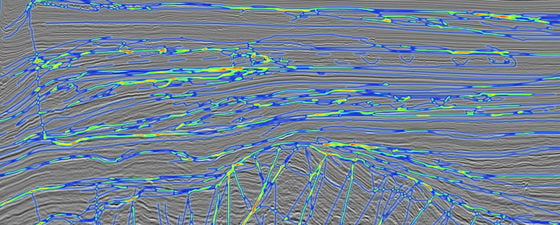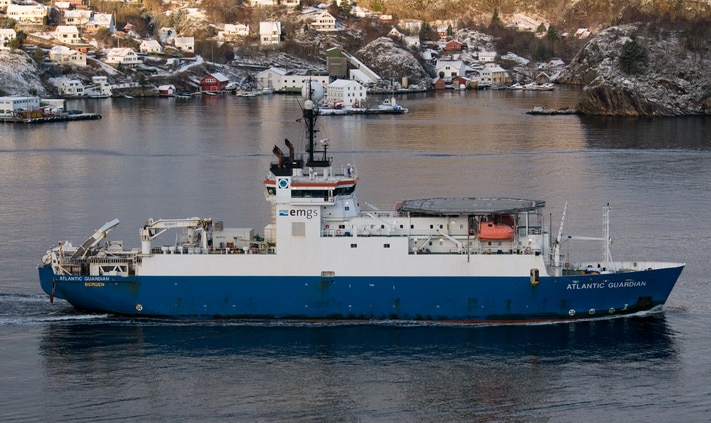Tolulope Ewherido, Vice President, Technical-Geoscience at ExxonMobil, is able to satisfy her passion for technology and her interest in Big Data, while steering the company towards the most efficient use of new digital tools.
Tolu speaking at the at the panel session on ‘Next Age Technology: Big Data, Big Success’ during the AAPG International Conference and Exhibition in Capetown in 2018. © AAPG.
The routes into a career in geoscience are many and varied – but rarely involve architecture, the subject that Tolu Ewherido initially intended studying. “I’m an accidental geologist,” she laughs. “I started studying architecture at the University of Ibadan, in Nigeria, and I am still interested in the subject, but after my first year, the funding for the course was pulled, so I had to find something else. In school I had always enjoyed geography and anything to do with the formation of the earth, so I transferred to geology and soon found I loved it. I also discovered I had a natural affinity for the subject, because despite missing the whole of the first year I graduated first in my class.”
While at university Tolu undertook an internship with Mobil, working in an asset team, and this confirmed for her that oil and gas was the path she wanted to travel. “In Nigeria, all graduates must do a year’s internship,” she explains, “so I did that with Mobil and then in 1991 I applied for and got a job with the company. I was an operations geologist, and on my first trip offshore I was the only woman, with seven guys. The ‘company man’ ended up giving me his bathroom – the only single one – in those days they just weren’t prepared for women on the rigs. But I have to say, the men on the rigs were always absolute gentlemen. That surprised me a bit, because from the way people talk you get the impression that they would be rough, but for me it was actually a really nice experience and everyone went out of their way to help.”
Maximizing Productivity and Value
Tolu and friends on a clastic stratigraphy field trip in 1993.
After a couple of years in the asset team working on the Mobil Producing Nigeria development and appraisal drilling programs, Tolu transferred to the production geoscience team. Overall, she reckons that about a third of her career has been spent in exploration and the rest in the production arena.
“I have to admit, I’m a production geologist at heart,” she continues. “I really like the part of the value chain post-discovery when you are evaluating the field and working out the concepts that will deliver maximum productivity, recovery and profitability and then executing that over the life of the field.”
Tolu initially worked on the development planning and start-up of the Oso field, the only condensate development project in Nigeria, and also on the Usari field, where the complex shallow marine fan stratigraphy has resulted in more than 11 distinct reservoir compartments. Having helped bring these fields onto production, the asset team then needed to concentrate on optimizing recovery over the life cycle of these fields.
By 2000 Tolu was the Asset Team Leader for the Usari field. She was responsible for coordinating creation and implementation of asset business plans consistent with business outlook and the execution of activities focused on maximizing value through the asset lifecycle. “Our asset teams are cross-disciplinary, with facilities and production engineers as well as geologists. This was my first foray into cross-functional working, and I found I really loved it,” Tolu continues. “At the end of the day, the value of these reservoirs comes through bringing together the best solutions cross-functionally and leveraging them across those functions. This suited me perfectly; I think I have a natural affinity for it but also, I love the way it brings together a range of expertise, some of which at the time I wasn’t very familiar with, so it gave me a huge amount of growth. It also helped me understand how the business makes money and I really liked gaining a deeper understanding of that. You don’t get such knowledge if you only do geoscience work, but having obtained it, I’ve found that having an understanding of ‘where the money comes from’ has been key to my career progression.
“I was quite young at this time, and I was lucky to be working with and learning from men who had 20 years’ experience or more. However, as I was team leader, it also produced some interesting dynamics that I had to learn how to navigate. Nigeria’s culture is both hierarchical and patriarchal; I recognized that though these older men worked for me, I had to show them that I valued and respected them to fully leverage their expertise and participation on the team. It was a fine balance; for example, I never used their first names which, even though acceptable in the business environment, is perceived as culturally disrespectful. I think that realizing I respected them culturally, they were more willing to respect me and my ideas professionally. It was excellent experience.”
A Move to the US
Another field trip in 1993, this time on deepwater stratigraphy.
In 1996 Tolu transferred to Mobil Technology Company, Dallas for three years, working on reservoir characterization and field simulation studies. Following the Exxon and Mobil merger in 2001, she moved to Houston to take up a very different role in the new company: that of Geoscience Functional Advisor, responsible for stewarding career development and training plans for about 60 ExxonMobil development and production geoscientists in Houston, New Orleans and Nigeria.
“In this new role I was responsible for training, career development and recommendations, working as an advisor to the production geoscientists. I talked to them about their current jobs and aspirations; if they needed mentoring, I connected them, or helped with training. I was working at a very close personal level with people in the early stages of their careers, some of whom have become close personal friends. It was very satisfying.
“Around this time, I took a career break of about a year, as I had just had twins, making four kids under five! The company has flexible career policies and is very supportive over career breaks, ensuring that when you return you will be able to continue on your career path. It’s great to know you have the freedom to ask and you’re not taking a risk; you know there will be a good job offered to you on your return. I have taken advantage of this opportunity on four occasions, taking breaks of between two months and a year. It has worked well and I would not have progressed my career to the extent I have without being afforded these flexibilities; I was able to take time out and be at home when I felt I needed it, and then when I returned, I was able to give myself 150% to the job. You can only be creative and at your best at work, or home, when your whole self is present.”
She points out that her husband also works for ExxonMobil, which makes it easier to balance work requirements and home life; for example, they can ensure that at any one time they do not both have jobs at the same time that require traveling.
“When I came back after the twins I wanted to work part-time, so I was offered a role developing a training course that integrated geoscience and engineering together with economic analysis, so the experience I had gained previously proved very useful. I’m pretty proud of the fact that the concepts I developed on that course remained on the core curriculum for early career geoscientists until very recently,” she adds.
Head of Technical Geoscience at ExxonMobil
On the well site in 1992 – taking a much-needed mental break between multiple well operations!
She traveled back to Houston in 2012 and has remained in the US since then, working in different functional and cross-functional executive roles. “I could not have mapped my career path to get me to where I am now, but in retrospect I realize that as a global company, ExxonMobil is really good at identifying talent and helping people reach their potential in the countries where we do business,” she explains.
In 2017 she was promoted to yet another exciting and rather different role: that of Vice President, Technical-Geoscience in ExxonMobil.
“This is a global role with probably the broadest scope of any I have had,” Tolu explains. “My remit is to acquire seismic and well data on behalf of the business, so I am working with vendors and also using the expertise within the company. I have core technical experts within my group and we can deploy them wherever they are needed in ExxonMobil. My team must ensure that within the company we are applying the best technologies, whether sourced internally from our research group or externally from vendors, and that they are quickly embedded so our geoscientists can make full use of them. Sometimes we work with vendors or other researchers on ideas that we see benefit in developing but which we don’t feel need to be proprietary. With the development of digital tools, the role of new technologies has become very significant.
“I am excited by the industry’s use of big data and digitalization. I think we are all trying to use it to evolve machine learning techniques to reduce cycle time. The foundational element to begin that digital journey really is big data. The things we need to put in place in terms of the infrastructure need not be proprietary, and the fact that we are all doing it separately at the moment means that we are spending more money and we will all end up maintaining independent platforms at high cost for a long time. This is too expensive and not effective. We need to work on open data standards together so everything can be integrated, or we run the risk of producing individual, sub-optimal solutions.
“In ExxonMobil we have signed up to the Open Subsurface Data Universe, a consortium open to all operators and oilfield service companies. The idea is to come up with common standards. It’s early days yet, but at least the conversation is progressing – it’ll be interesting to see where it goes,” she adds.
What Lies Ahead?
Tolu feels very grateful to ExxonMobil for the route her career has taken and has never felt stuck or in a dead end.
“I feel that the company’s career development strategies allow you to have multiple careers in one. I’ve enjoyed each job, but always found the next one to be new, interesting, stimulating and different; I think we make a pretty good job of developing our workforce and allowing them to grow. My story is testament to that.”
With such a varied career behind her, where would Tolu like her career to take her next?
“I enjoy the diversity of roles that is available to me and love chances to expand my knowledge,” she replies. “I do like to be in roles that are impactful and add value to ExxonMobil either in the business or in developing our pipeline of talent. I’m interested in anything that deals with diversity – not just physical difference, but in harnessing the diversity of thought, and integrating it into reaching better solutions. That really interests me, so who knows what roles lie ahead of me!”





